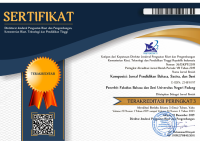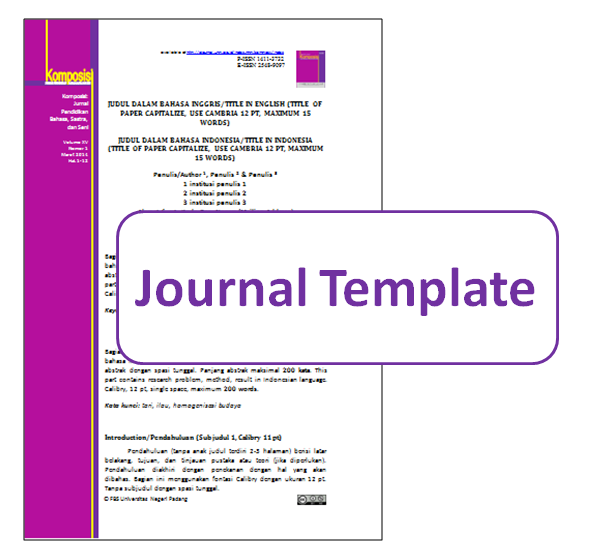IMPROVING INDONESIAN LANGUAGE LEARNING OUTCOMES USING INQUIRY MODELS IN CLASS IX STUDENTS OF SATAP SUNGAI BERTAM
Abstract
Junior high school SATAP Sungai Bertam set KKM indonesian language subject class IX of 78 with the provisions of 100% complete, still very many students who have not reached completeness, the purpose of this research is to increase learning outcome in indonesian language subject in class IX. This research is a classroom action research conducted in two cycles with two learning meetings, which includes: planning, implementation, and reflection, 26 study subjects consisted of 12 males and 14 females, Data collection techniques used a written assessment, observations in the form of indicators of teacher and student success, the results showed that on the pre cycle of percentage of student learning outcomes that is 35%, with the highest 79, the lowerst 50, and the average 66,58, in the first cycle increased by a percentage 73%, with the highest 80, the lowerst 65, and the average 76,27, then in the second cycle is 100% complete with the highest 85, the lowest 80, and the average score 82,81. Based on these results, it can be concluded that inquiry learning model can improve the learning outcomes of grade IX students in indonesian languange subjects at Junior high school SATAP Sungai Bertam.
Keywords
Full Text:
PDFReferences
BSNP, B. S. (2006). Standar Isi untuk satuan pendidikan dasar dan menengah; standar kompetensi dan kompetensi dasar SMP/MTs. Jakarta: Badan Standar Nasional Pendidikan (BSNP).
Baharudin. (2016, April). Penerapan metode inkuiri untuk meningkatkan hasil belajar bahasa Indonesia aspek membaca siswa kelas IX SMP Negeri 1 Bengkalis. Madah, 7(1), 11 - 24.
Creswell, J. W. (2008). Education research; Planning, conducting, and evaluating quantitative and qualitative research (Third ed.). Amerika: Pearson Education., Inc.
Faturrahman, P. & Sutikno, M. S. (2007). Strategi belajar mengajar. Jakarta: PT. Refika Aditama.
Hamdi, M. (2016). Teori kepribadian sebuah pengantar (1st ed.). Bandung: Alfabeta.
Kartini, Sabri, T., & H. Zainuddin. (2015). Penggunaan metode inkuiri untuk meningkatkan hasil belajar siswa di SMP 51 Sungai Kunyit. Fakultas Keguruan Dan Ilmu Pendidikan Universitas Tanjung Pura Pontianak.
Latif, M. (2007). Bimbingan skripsi; tesis dan artikel ilmiah. Jambi: Sulthan Thaha press.
Mulyasa, E. (2003). Kurikulum berbasis kompetensi, konsep, karakteristik dan implementasi. Bandung: PT. Remaja Rosda Karya.
Priyatni, E. T. (2002). Penerapan konsep kontekstual dalam pembelajaran bahasa Indonesia. dalam Kumpulan materi tot ctl mata pelajaran Bahasa Indonesia Sekolah Lanjutan Tingkat Pertama. Jakarta: Depdiknas.
Sanjaya. (2005). Pendekatan contextual teaching and learning (CTL). Jakarta: Rafika Media.
Sardiman. (2014). Interaksi & motivasi belajar mengajar (22 ed.). Jakarta: Rajawali Pers.
SMPN SATAP Sungai Bertam, (2018). Arsip rekapitulasi, Nilai Ulangan Harian Siswa kelas IX SMPN SATAP Sungai Bertam
DOI: https://doi.org/10.24036/komposisi.v20i1.101285
Refbacks
- There are currently no refbacks.
Copyright (c) 2019 Komposisi: Jurnal Pendidikan Bahasa, Sastra, dan Seni

This work is licensed under a Creative Commons Attribution-NonCommercial 4.0 International License.
Komposisi: Jurnal Pendidikan Bahasa, Sastra, dan Seni, a peer-reviewed online journal in languages, literature, and arts education.
Printed ISSN 1411-3732, Online ISSN 2548-9097.
Currently, Komposisi: Jurnal Pendidikan Bahasa, Sastra, dan Seni is indexed by:











